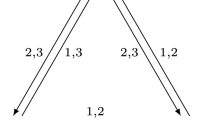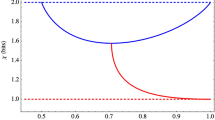Abstract
Developing a good theoretical understanding of the role of trust in IR (such as in the events leading to the end of the Cold War) is still an open problem. Most game-theoretic studies of trust do not go beyond the limitations of an (ontologically) individualistic paradigm, thus assuming a pre-defined set of individual strategies. Yet, it is a fact that the predicament of collective trust is empirically resolved in many situations. This paper suggests a new game-theoretic approach—Quantum Game Theory (QGT)—to understand and explain how the predicament of trust is resolved. In a quantum game of trust the actors play the game by simultaneously collectively reconstructing the strategic environment in such a way as to become mutually strategically entangled. Quantum strategic entanglement allows trust to emerge between the two actors without assuming a need for signaling, prior “contract” type of arrangement, or any form of third-party communication. The paper develops and solves such a model of quantum game of trust
Similar content being viewed by others
References
Abouraddy A.F. et al. (2001). Degree of entanglement for two qubits. Physical Review A 64, 050101(R), 1–4.
E. Adler M. Barnett (Eds) (1998) Security Communities Cambridge University Press New York
D. Aerts J. Broekaert S. Smets (1999) ArticleTitleThe Liar-paradox in a quantum mechanical perspective Foundations of Science 4 115–132
A. Boukas (2000) ArticleTitleQuantum formulation of classical two-person zero-sum games Open Systems and Information Dynamics 7 19–32 Occurrence Handle10.1023/A:1009699300776
G. Brennan (1998) Democratic trust: a rational-choice theory view Braithwaite Valerie Levi Margaret (Eds) Trust and Governance Russell Sage Foundation New York 197–217
B. Chapman (1998) ArticleTitleMore easily done than said: rules, reason and rational social choice Oxford Journal of Legal Studies 18 293–329 Occurrence Handle10.1093/ojls/18.2.293
L.K. Chen H. Ang D. Kianga L.C. Kwek C.F. Lo (2003) ArticleTitleQuantum prisoner dilemma under decoherence Physics Letters A 316 317–323
K-Y. Chen T. Hogg R. Beausoleil (2002a) ArticleTitleA quantum treatment of public goods economics Quantum Information Processing 1 IssueID6 449–469 Occurrence Handle10.1023/A:1024070415465
Jing-Ling Chen L.C. Kwek C. H. Oh (2002b) ArticleTitleNoisy quantum game Physical Review A 65 0523201–0523206
J. Derrida (1978) Writing and Difference Routledge & Kegan Paul London
M. Dresher (1981) The Mathematics of Games of Strategy Dover New York
J. Du H. Li X. Xu X. Zhou R. Han (2002) ArticleTitleEntanglement enhanced multiplayer quantum games Physics Letters A 302 IssueID5 229–233 Occurrence Handle10.1016/S0375-9601(02)01144-1
J. Du H. Li X. Xu X. Zhou R. Han (2003) ArticleTitlePhase-transition-like behaviour of quantum games Journal of Physics A: Mathematical and General 36 IssueID23 6551–6562 Occurrence Handle10.1088/0305-4470/36/23/318
Jiangfeng Du H. Li C. Ju (2003b) ArticleTitleQuantum games of asymmetric information Physical Review E 68 0161241–0161245 Occurrence Handle10.1103/PhysRevE.68.016124
J. Eisert M. Lewenstein (1999) ArticleTitleQuantum games and quantum strategies Physical Review Letters 83 3077–3080 Occurrence Handle10.1103/PhysRevLett.83.3077
J. Eisert M. Wilkens (2000) ArticleTitleQuantum games Journal of Modern Optics 47 IssueID14 2543–2556 Occurrence Handle10.1080/095003400750039537
J. Eisert M. Wilkens M. Lewenstein (1999) ArticleTitleQuantum games and quantum strategies Physical Review Letters 83 IssueID15 3077–3080 Occurrence Handle10.1103/PhysRevLett.83.3077
A.P. Flitney D. Abbott (2002a) ArticleTitleQuantum version of the Monty Hall problem Physical Review A 65 062318 Occurrence Handle10.1103/PhysRevA.65.062318
A.P. Flitney D. Abbot (2002) ArticleTitleAn introduction to quantum game theory Fluctuation and Noise Letters 2 IssueID4 R175–R187
A.P. Flitney J. Ng D. Abbott (2002) ArticleTitleQuantum Parrondo’s games Physica A 314 IssueID1 35–42 Occurrence Handle10.1016/S0378-4371(02)01084-1
A.P. Flitney D. Abbott (2003) ArticleTitleAdvantage of a quantum player over a classical one in 2 × 2 quantum games Proceedings: Mathematical, Physical and Engineering Sciences 459 IssueID2038 2463–2474 Occurrence Handle10.1098/rspa.2003.1136
R. L. Garthoff (1994) The Great Transition The Brookings Institute Washington DC
Grib A. and Parfionov, G. (2003), Can the game be quantum? arXiv: quant-ph/0206178.
F. Guinea M.A. Martin-Delgado (2003) ArticleTitleQuantum Chinos game: winning strategies through quantum fluctuations Journal of Physics A: Mathematical and General 36 IssueID13 197–204 Occurrence Handle10.1088/0305-4470/36/13/104
Y. Han Y.-S. Zhang G. Guo (2002) ArticleTitleW State and Greenberger-Horne-Zeilinger state in quantum three-person prisoner’s dilemma Physics Letters A 295 IssueID2 61–64 Occurrence Handle10.1016/S0375-9601(02)00168-8
J. Harsanyi (1977) Rational Behavior and Bargaining Equilibrium in Games and Social Situations Cambridge University Press New York
J. Harsanyi R. Selten (1988) A General Theory of Equilibrium Selection in Games MIT Press Cambridge, MA
S. Hill W. Wootters (1997) ArticleTitleEntanglement of a pair of quantum bits Physical Review Letters 78 IssueID26 5022–5025 Occurrence Handle10.1103/PhysRevLett.78.5022
A. Iqbal A.H. Toor (2001) ArticleTitleEvolutionary stable strategies in quantum games Physics Letters A 280 249 Occurrence Handle10.1016/S0375-9601(01)00082-2
A. Iqbal A.H. Toor (2002a) ArticleTitleDarwinism in quantum systems? Physics Letters A 294 IssueID5 261–270 Occurrence Handle10.1016/S0375-9601(02)00067-1
A. Iqbal A.H. Toor (2002b) ArticleTitleQuantum cooperative games Physics Letters A 293 IssueID3 103–108 Occurrence Handle10.1016/S0375-9601(02)00003-8
A. Iqbal A.H. Toor (2002) ArticleTitleQuantum repeated games Physics Letters A 300 IssueID6 541–546 Occurrence Handle10.1016/S0375-9601(02)00893-9
R. Jervis (1988) ArticleTitleRealism, game theory, and cooperation World Politics 40 IssueID3 317–349
R. Kay N.F. Johnson S.C. Benjamin (2001) ArticleTitleEvolutionary quantum game Journal of Physics A: Mathematical and General 34 IssueID41 547–552 Occurrence Handle10.1088/0305-4470/34/41/101
Robert O. Keohane L.L. Martin (1995) ArticleTitleThe promise of institutionalist theory International Security 20 IssueID1 39–51
J. Kim (1984) ArticleTitleConcepts of supervenience Philosophy and Phenomenological Research 45 153–76
A. Kydd (2000) ArticleTitleTrust, reassurance, and cooperation International Organization 54 IssueID2 325–57 Occurrence Handle10.1162/002081800551190
D. Lake R. Powell (Eds) (1999) Strategic Choice and International Relations Princeton University Press Princeton, NJ
Deborah W. Larson (1997) ArticleTitleTrust and missed opportunities in international relations Political Psychology 18 IssueID3 701–734 Occurrence Handle10.1111/0162-895X.00075
D. Lax J.K. Sebenius (1986) The Manager as Negotiator Free Press New York
C.F. Lee N.F. Johnson (2003) ArticleTitleQuantum game theory Physical Review A 67 022311
H. Li J. Du S. Massar (2002) ArticleTitleContinuous-variable quantum games Physics Letters A 306 IssueID2 73–78 Occurrence Handle10.1016/S0375-9601(02)01628-6
Y.J. Ma G.L. Long F.G. Deng F. Li S.X. Zhang (2002) ArticleTitleCooperative three- and four-player quantum games Physics Letters A 301 IssueID3 117–124 Occurrence Handle10.1016/S0375-9601(02)00989-1
Marinatto L., Weber T. (2000), A quantum approach to static games of complete information. Physics Letters A 272, 291.
F. McGillivray A. Smith (2000) ArticleTitleTrust and cooperation through agent-specific punishments International Organization 54 IssueID4 809–824 Occurrence Handle10.1162/002081800551370
J.J. Mearsheimer (1991) Back to the future: instability in Europe after the cold war Sean M. Lynn-Jones (Eds) The Cold War and After MIT Press Cambridge, MA 141–192
D. Meyer (1999) ArticleTitleQuantum strategies Physical Review Letters 82 1052 Occurrence Handle10.1103/PhysRevLett.82.1052
A. Nawaz A.H. Toor (2004) ArticleTitleDilemma and quantum battle of sexes Journal of Physics A: Mathematical and General 37 IssueID15 4437–4443 Occurrence Handle10.1088/0305-4470/37/15/011
H.T. Nguyen V. Kreinovich V. Shekhter (1998) ArticleTitleOn the possibility of using complex values in fuzzy logic for representing inconsistencies International Journal of Intelligent Systems 13 683–714 Occurrence Handle10.1002/(SICI)1098-111X(199808)13:8<683::AID-INT1>3.0.CO;2-F
E.W. Piotrowski J. Sladkowski (2002a) ArticleTitleQuantum bargaining games Physica A 308 IssueID1 391–401
E.W. Piotrowski J. Sladkowski (2002b) ArticleTitleQuantum market games Physica A 312 IssueID1 208–216 Occurrence Handle10.1016/S0378-4371(02)00842-7
E.W. Piotrowski J. Sladkowski (2003a) ArticleTitleQuantum English auctions Physica A 318 IssueID3 505–515
E.W. Piotrowski J. Sladkowski (2003b) ArticleTitleTrading by quantum rules: quantum anthropic principle International Journal of Theoretical Physics 42 IssueID5 1101–1106
E.W. Piotrowski J. Sladkowski (2001) ArticleTitleQuantum-like approach to financial risk: quantum anthropic principle Acta Physica Polonica B 32 3873
E.W. Piotrowski J. Sladkowski J. Syska (2003) ArticleTitleInterference of quantum market strategies Physica A 318 IssueID3 516–528
E.W. Piotrowski J. Sadkowski (2003c) ArticleTitleAn invitation to quantum game theory International Journal of Theoretical Physics 42 IssueID5 1089–1099
Piotrowski E. W. (2003), The next stage: quantum game theory. arXiv: quant-ph/0308027.
I. Pitowsky (1986) ArticleTitleThe range of quantum probability Journal of Mathematical Physics 27 IssueID6 1556–1565 Occurrence Handle10.1063/1.527066
A. Plotnisky (1994) Complementarity: Anti-Epistemology after Bohr and Derrida Duke University Press Durham, CT
J.R. Searle (1995) The Construction of Social Reality The Free Press New York
J. Sladkowski (2003) ArticleTitleGiffen paradoxes in quantum market games Physica A 324 IssueID1 234–240 Occurrence Handle10.1016/S0378-4371(02)01859-9
A. Stein (1999) The limits of strategic choice: constrained rationality and incomplete explanation David Lake Robert Powell (Eds) Strategic Choice and International Relations Princeton University Press Princeton, NJ 196–228
S. Waite (2002) Quantum Investing Texere Publishing London
J. Watson (1999) ArticleTitleStarting small and renegotiation Journal of Economic Theory 85 52–90 Occurrence Handle10.1006/jeth.1998.9999
B.R. Weingast (1998) Constructing trust: the political and economic roots of ethnic and regional conflict Karol Sultan Eric M. Uslaner Virginia Haufler (Eds) Institutions and Social Order The University of Michigan Press Ann Arbor, MI 163–200
W. Wootters (1998) ArticleTitleEntanglement of formation of an arbitrary state of two qubits Physical Review Letters 80 IssueID10 2245–2248 Occurrence Handle10.1103/PhysRevLett.80.2245
P. Zelikow C. Rice (1995) Germany Unified and Europe Transformed Harvard University Press Cambridge MA
Author information
Authors and Affiliations
Corresponding author
Rights and permissions
About this article
Cite this article
Arfi, B. Resolving the Trust Predicament: A Quantum Game-theoretic Approach. Theor Decis 59, 127–174 (2005). https://doi.org/10.1007/s11238-005-8632-4
Issue Date:
DOI: https://doi.org/10.1007/s11238-005-8632-4




